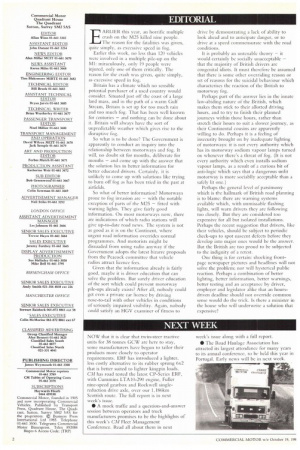ARLIER this year, an horrific multiple crash on the M25 killed nine people.
Page 4

If you've noticed an error in this article please click here to report it so we can fix it.
Tlw reason for the fatalities was given, quite simply, as excessive speed in fog.
Earlier this week, no less than 120 vehicles were involved in a multiple pile-up 011 the Ml: miraculously, only 19 people were injured, only one of them critically. The reason for the crash was given, quite simply, as excessive speed in fog.
Britain has a climate which no sensible potential purchaser of a used country would consider. Situated just off the coast of a large land mass, and in the path of a warm Gulf Stream, Britain is set up for too much rain and too much fog. That has been well known for centuries — and nothing can be done about it. Britain will always have the sort of unpredictable weather which gives rise to the disruptive fog.
So what is to be done? The Government is apparently to conduct an inquiry into the relationship between motorways and fog. It will, no doubt sit for months, deliberate for months — and come up with the answer that the solution lies in better information for better educated drivers. Certainly, it is unlikely to conic up with solutions like trying to burn off fog as has been tried in the past at airfields.
So what of better information? Motorways prone to fog invasion are — with the notable exception of parts of the M25 — fitted with warning lights. They give fairly good information. On most motorways now, there arc indications of which radio stations will give up-to-date road news. The system is not as good as it is on the Continent, where urgent road information overrides normal programmes. And motorists might be dissuaded from using radio anyway if the Government adopts the latest bizarre proposals from the Peacock committee that vehicle radios attract licence fees.
Given that the information already is fairly good, maybe it is driver education that can solve the problem. But surely driver education of the sort which could prevent motorway pile-ups already exists? After all, nobody could get even a private car licence by driving nose-to-tail with other vehicles in conditions of seriously impaired visibility. Again, nobody could satisfy an HGV examiner of fitness to drive by demonstrating a lack of ability to look ahead and to anticipate danger, or to drive at a speed commensurate with the road conditions.
It is probably an untenable theory — it would certainly be socially unacceptable — that the majority of British drivers are congenital idiots. It must therefore be assumed that there is some other overriding reason or set of reasons for the suicidal behaviour which characterises the reaction of the British to motorway fog.
Perhaps part of the answer lies in the innate law-abiding nature of the British, which makes them stick to their allotted driving hours, and to try to finish their planned journeys within those hours, rather than stretch their hours to suit a slower journey, as their Continental cousins are apparently willing to do. Perhaps it is a feeling of insecurity brought on by inadequate lighting of motorways: it is not every authority which has its motorway sodium vapour lamps turned on whenever there's a threat of fog. (It is not every authority which even installs sodium vapour lamps, as a result of a curious bit of anti-logic which says that a dangerous unlit motorway is more sociablly acceptable than a safely lit one.) Perhaps the general level of parsimony which is the hallmark of British road planning is to blame: there are warning systems available which, with unmissable flashing lights, will warn drivers they are following too closely. But they are considered too expensive for all but isolated installations. Perhaps the recent suggestion that drivers, like their vehicles, should be subject to periodic check-ups to spot nascent defects before they develop into major ones would be the answer. But the British are too proud to be subjected to the indignity of a retest.
One thing is for certain: shocking frontpage newspaper pictures and headlines will not solve the problem; nor will hysterical public reaction. Perhaps a combination of better lighting, better information, better warnings, better testing and an acceptance by driver, employer and legislator alike that an hoursdriven deadline should not override common sense would do the trick. Is there a minister in the house who will underwrite a solution that expensive?




































































































